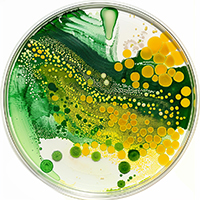Scientific Posters
Zymo Research's scientific posters highlight the latest breakthroughs in molecular biology, showcasing innovations spanning from epigenetics to microbiomics. We are proud to present insights from our collaborations with leading scientists and institutions worldwide, with more contributions to the field of life science on the horizon.
Featured Poster

An Integrated Approach for Pathogen Detection, AMR Monitoring, and Functional Analysis in Wastewater
X. Cheng , J. Wilkinson, K. Ngo , P. Baybayan, Y. Kim, P. Pham, E. Carrasco, S. Tang, J. Shen, and K. LockenWastewater surveillance has emerged as a pivotal tool in public health epidemiology. Particularly catalyzed by the Covid-19 pandemic, modern culture-independent sequencing methods have become indispensable due to their ability to offer a comprehensive perspective.
View PosterThe Epigenetic Clock Applies to Human Urine
Wei Guo, Steve Horvath, Michiko Suwoto, Yap Ching Chew, and Xi Yu JiaSeveral recent articles describe epigenetic biomarkers of aging based on methylation levels. For example, theepigenetic clock method (Horvath 2013, PMID: 24138928) is based on...
View PosterAn Integrated Approach for Pathogen Detection, AMR Monitoring, and Functional Analysis in Wastewater
X. Cheng, J. Wilkinson, K. Ngo, P. Baybayan, Y. Kim, P. Pham, E. Carrasco, S. Tang , J. Shen, and K. LockenWastewater surveillance has emerged as a pivotal tool in public health epidemiology. Particularly catalyzed by the Covid-19 pandemic, modern culture-independent sequencing methods have become indispensable due to their ability to offer a comprehensive perspective. In this study, we present an innovative, integrated approach for simultaneous pathogen detection, antimicrobial resistance (AMR) monitoring, and functional analysis within wastewater systems. By harnessing advanced sample preparation technologies provided by Zymo Research and leveraging PacBio Onso short-read sequencing, our objective is to elevate our comprehension of microbial dynamics within wastewater environments.
View PosterA Fast and Simple Method for Whole-Genome Bisulfite Sequencing Library Preparation from Ultra-low DNA input: Pico-MethylSeq Library Preparation Kit
Karolyn Giang, TzuHung Chung, Xueguang Sun, & Xi-Yu JiaThe distribution of 5-methylcytosine (5-mC) in DNA within the eukaryotic genome is known to greatly affect gene regulation and is currently a major topic of research. Studies on DNA methylation have been aided by advancements in bisulfite conversion and next-gen sequencing technologies which, when coupled, provide single-base resolution of 5-mC in the whole genome. Many whole-genome bisulfite sequencing (WGBS) library preparation protocols designed to analyze 5-mC distribution in the whole genome employ bisulfite to convert unmethylated cytosine bases to uracil after the library preparation and while these protocols produce reliable results, degradation of DNA is inherent to bisulfite conversion. As such, a large proportion of the adapterized library is fragmented and can no longer be amplified, which requires these protocols to call for large amounts of starting input DNA that is often times impossible to obtain. By rearranging the order of library preparation and bisulfite conversion, we developed a streamlined protocol that reveals whole-genome methylation patterns at single-base resolution. The work-flow leads with the degradation inherent to bisulfite conversion to randomly fragment the DNA prior to the library preparation, which allows the protocol to accommodate for pico-gram quantities of starting input, making it ideal for analysis in precious and limited samples. Comparisons of sequencing data from this WGBS library preparation method with the established Reduced Representation Bisulfite Sequencing method using human DNA showed a correlation coefficient of 0.95 for CpG sites with more than 10X coverage. With slight modifications, this protocol is versatile in its ability to prepare libraries for ChIP-seq and RNA-seq.
View PosterA Novel Method for Locus Specific Detection of 5-Hydroxymethylcytosine
James L. Yen, Stella Choi, Marc Van Eden, & Xi Yu JiaEpigenetic misregulation leading to diseases, such as cancer, has classically been understood in terms of aberrant DNA methylation patterns. For decades, 5-methylcytosine (5mC) has been the focus of epigenetic DNA modification studies. But recently, a novel epigenetic DNA modification, 5-hydroxymethylcytosine (5hmC), has been shown to be present at high levels in mammalian brain and ES cells. 1,2 It has also been found at appreciable levels in many normal and diseased tissues. DNA methylation (5-methylcytosine) plays a major role in gene regulation. Promoters of many genes are methylated for regulated gene silencing. When this set DNA methylation pattern is undermined, the risk of acquiring diseases may increase. It has been well documented that many diseases (e.g. cancer, neurodegenerative diseases, etc.) have epigenetic roots. Many of these misregulated epigenetic alterations have proven to be reliable markers of disease or of disease progression. The role of the newly discovered, “6 th base” (5- hydroxymethylcytosine) is less clear. Unlike methylation, 5hmC has been shown to be found predominantly within gene bodies as well as non-promoter regions. Its role in biology has been speculated to be involved in DNA demethylation (active and passive) as well as in poising genes for later activation. Current tools available to map DNA methylation (e.g. bisulfite conversion) cannot distinguish between 5mC and 5hmC. 3 Here we describe the first method for locus specific interrogation of 5hmC within DNA by use of our Quest 5-hmC Detection Kit™.
View PosterA Novel One-Step Method for Rapid and Accurate DNA Methylation Quantification
Onyi Chima , Lam Nguyen , Michelle Rabot & Xi Yu JiaDNA methylation plays a central role in widespread biological phenomena. Current methods used to evaluate DNA methylation such as Bisulfite Sequencing and Methylation Specific PCR present a number of problems as they are expensive, lengthy and involve multiple steps that increase chances of contamination. Therefore, we sought to develop a one-step system for rapid and accurate DNA methylation quantification. Here, we describe a simple method that exploits the specificity of Methylation Specific Restriction Enzymes (MSRE) to digest unmethylated CpG dinucleotides juxtaposed to real-time PCR for the selective amplification of methylated DNA. Thus, integration of the multiple steps of traditional procedures into one simple step decreases chances of contamination and allows for rapid and accurate DNA methylation percentage quantification. Our one-step MSRE-qPCR system selectively amplified methylated DNA and accurately measured methylation profiles of known DNA methylated standards. Methylation percentages of blind controls determined by the one-step system closely coincided with actual methylation percentages. This assay has proven to be a cost-effective assay for accurate region-specific methylation status quantification and will be a valuable tool in research and diagnostics
View Poster
